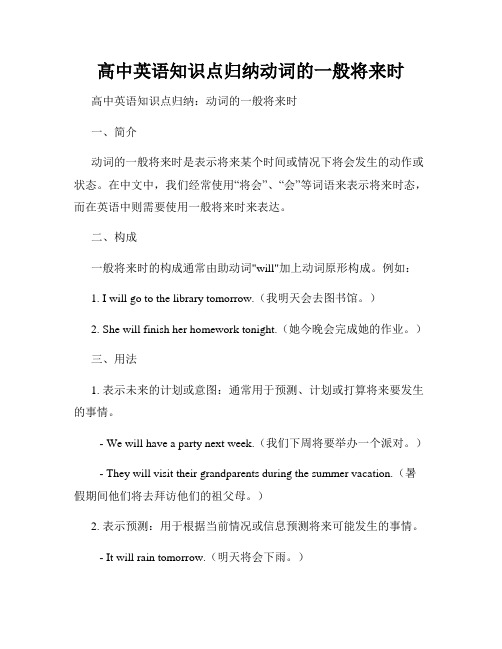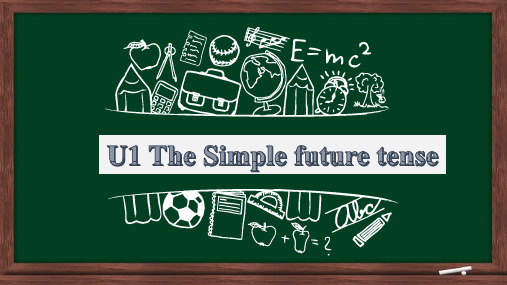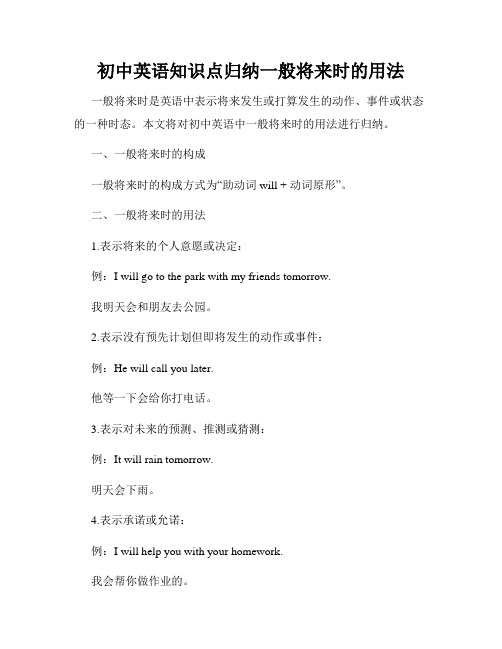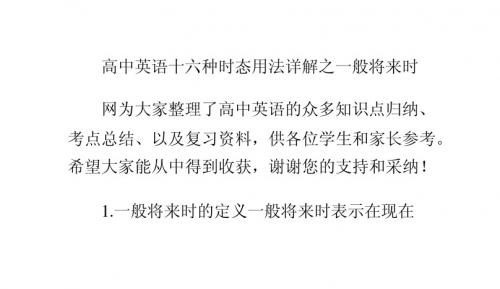英语的一般将来时态归纳及用法
高中英语知识点归纳动词的一般将来时

高中英语知识点归纳动词的一般将来时高中英语知识点归纳:动词的一般将来时一、简介动词的一般将来时是表示将来某个时间或情况下将会发生的动作或状态。
在中文中,我们经常使用“将会”、“会”等词语来表示将来时态,而在英语中则需要使用一般将来时来表达。
二、构成一般将来时的构成通常由助动词"will"加上动词原形构成。
例如:1. I will go to the library tomorrow.(我明天会去图书馆。
)2. She will finish her homework tonight.(她今晚会完成她的作业。
)三、用法1. 表示未来的计划或意图:通常用于预测、计划或打算将来要发生的事情。
- We will have a party next week.(我们下周将要举办一个派对。
) - They will visit their grandparents during the summer vacation.(暑假期间他们将去拜访他们的祖父母。
)2. 表示预测:用于根据当前情况或信息预测将来可能发生的事情。
- It will rain tomorrow.(明天将会下雨。
)- He will become a famous writer in the future.(他将来会成为一名著名作家。
)3. 表示习惯性行为:用于描述一般性的将来情况,在特定条件下发生的动作或状态。
- The train will arrive at 9 a.m. every day.(列车每天早上9点到达。
)- He will always help others when they are in need.(当别人需要帮助时,他总是会帮助。
)4. 表示可能性:用于表示某事可能在将来发生,但并不确定。
- She will probably pass the exam.(她可能会通过考试。
)- It might rain later.(天气可能会变雨。
英语语法—一般将来时态

eg. My uncle is coming to see me tomorrow.
五、一般将来时特殊句式
1. There be 句式的一般将来时
Eg. There will be +其他 There is going to be+其他
2. 客观事实用一般现在
情态动词 (1)can/could:能够 could逾期 更委婉 (2)May/might 许可,准许 (3)Should 应该 主观义务
Have to 必须、不得不 (4)Must 主观必须,Must...?Yes,you must/no,you needn’t
Mustn’t 禁止 (5)Need 需要 Need...?Yes,you must/no,you needn’t
三、一般将来时 时间状语
Tomorrow、 Next week/month/year、 in+时间段、 this evening、 in the near future
四、一般将来时例句
1. 表示将来某个时间要发生的事 情或存在的状态。
eg.We will clean the room next week.
一、一般将来时用法(4)
1. 表示将来某个时间要发生的事 情或存在的状态。
3.条件、时间状语从句中,用一般 现在时表将来。
2. be going to 表示将要发生 或者打算、计划要做的事情,或者 可能发生的事情
4.go、come、leave、start等进行 时态表将来。
二、一般将来时结构 1. will / shall + 动词原形
Will / Shall +主语 + 动原 ?
初中英语知识点归纳一般将来时的用法

初中英语知识点归纳一般将来时的用法一般将来时是英语中表示将来发生或打算发生的动作、事件或状态的一种时态。
本文将对初中英语中一般将来时的用法进行归纳。
一、一般将来时的构成一般将来时的构成方式为“助动词 will + 动词原形”。
二、一般将来时的用法1.表示将来的个人意愿或决定:例:I will go to the park with my friends tomorrow.我明天会和朋友去公园。
2.表示没有预先计划但即将发生的动作或事件:例:He will call you later.他等一下会给你打电话。
3.表示对未来的预测、推测或猜测:例:It will rain tomorrow.明天会下雨。
4.表示承诺或允诺:例:I will help you with your homework.我会帮你做作业的。
5.表示对现在情况的预测或推测:例:She will be here soon.她马上就会到这里。
6.表示征求意见或征询意见:例:Will you come to the party tomorrow?明天你会来参加派对吗?7.表示习惯性或经常性的动作:例:He will often go swimming on weekends.他经常在周末去游泳。
三、一般将来时的否定与疑问句1.否定句构成:在will后面加not。
例:He will not come to the meeting tomorrow.他明天不会来开会。
2.疑问句构成:将助动词will提到句子的主语前面。
例:Will you pass me the salt, please?请你把盐递给我好吗?四、一般将来时的时间状语一般将来时可以与一些表示将来时间的时间状语连用,如:tomorrow,next week,in the future等。
例:I will visit my grandparents next week.我下周会去拜访我的祖父母。
高中英语十六种时态用法详解之一般将来时

要
发
生
的
事
情
。
如
:
Wearegoingtohaveameetingtodiscussthemattert
hisevening. 今 天 晚 上 开 会 讨 论 这 件 事 情 。
Lookattheblackcloudsoverthere.Ithinkitisgoi
ngtorainsoon.看一看那边的乌云,我想天要下雨
高中英语十六种时态用法详解之一般将来时 网为大家整理了高中英语的众多知识点归纳、 考点总结、以及复习资料,供各位学生和家长参考。
希望大家能从中得到收获,谢谢您的支持和采纳! 1.一般将来时的定义一般将来时表示在现在
看来即将要发生的动作或存在的状态。常用时间副 词 sometime tomorrow,soon 做 状 语 或 。 短 如 语 : nextyear/week/month,inafewdays,inthefuture,
商店就要关门了。(6)一般现在时。表示一种严格 按照计划进行的动作。比方说,上课、飞机起飞、 火 车 离 站 等 。 如 : Don ’ thurry.Themeetingstartsataquarterpasteight. 不 要 匆 忙 , 回 忆 八 点 过 一 刻 开 始 。 Thebusgoesbackatfourthirty.汽车四点返回。
么
时
istobepletedbytheendofthisyear. 这
渡桥该在今年年底前完工。(4)beaboutto+动词原 形。表示就要做或正好要做的事情。往往暗含一种 时间上的巧合,因此,句子不能再用时间状语。如: Don’tleave.LiLeiisabouttoe.不要走了,李蕾就 要来了。Bequiet.Theconcertisabouttostart.安 静下来,音乐演唱会就要开始了。 (5)be+现在分词。
英语一般将来时

英语一般将来时英语一般将来时,又称为未来时态,是用来表示将来会发生的动作、事件或状态的一种时态。
它的构成通常由"will" 或 "be going to" 加上动词原形来表示。
下面将详细介绍英语一般将来时的用法。
一、"will"的用法:1. 表示将来的决心、意图、打算或做出的决定。
例如:I will help you with your homework after dinner.(晚饭后我会帮你做作业。
)2. 表示对将来的预测、推测或猜测。
例如:It will rain tomorrow.(明天会下雨。
)3. 表示对将来的自然趋势、发展或趋势。
例如:Technology will continue to advance in the future.(科技将来会继续发展。
)4. 表示对将来的保证、允诺、请求或建议。
例如:I promise I will be on time for the meeting.(我保证会准时参加会议。
)二、"be going to"的用法:1. 表示对将来已经计划或决定好的事情。
例如:I am going to visit my grandparents this weekend.(这个周末我打算去看望我的祖父母。
)2. 表示对将来可能发生的事情有一种预见或判断。
例如:Look at those dark clouds. It's going to rain.(看那些乌云,将要下雨了。
)3. 表示以现有证据或迹象预测未来。
例如:She's been studying very hard. She's going to pass the exam.(她一直学得很努力,她一定会通过考试的。
)三、注意事项:1. 一般将来时中的时间状语词可以是今天、明天、以后、将来、下个月等表示将来的时间状语词。
英语动词时态用法归纳:一般将来时

英语动词时态用法归纳:一般将来时一、一般将来时的构成一般将来时的由s hall / will+ 动词原形构成。
二、一般将来时的基本用法(1) 表示单纯的将要发生的动作或情况。
常与表示将来的时间状语连用。
如:Tomorrow will be Sunday. 明天是星期天。
They say that it will rain. 他们说要下雨。
I’ll be thirty-seven on my next birthday. 到下次生日,我就三十七岁了。
We won’t be free tonight. 今晚我们没空。
(2) 也可以表示临时决定要做的事。
如:—I thought I asked you to sweep the floor.—O h, I’m sorry. Mother, I will do it right now.—我原以为我让你扫地了。
—噢,对不起,妈妈,我就做。
—You have left the door open.—O h, so I have. I’ll go and lock it.—你忘了锁门。
—哦,是的。
我就去。
(3) 有时虽没有时间状语,但从意思上可以判断指将来的动作。
如:Who will take the chair? 谁当主席?You will pass the examination. 你会通过那个考试的。
The meeting won’t last long. 会开不了多久。
(4) 一般将来时有时还表示倾向和习惯性。
如:Oil will float on water. 油总浮在水面上。
Fish will die without water。
鱼离开水就会死掉。
The machine won't work because of a faulty connection. 机器电源线接错了,所以开不动。
三、表示将来时的几种方法(1) be going to+动词原形。
一般将来时的五种表达方法
专题讲座一般将来时的五种表达方法汝城五中曾春梅一般将来时am/is/are/going to + do和will/shall + do1) shall用于第三人称单数,常被will所代替,二者都可以缩写成'll。
will在陈述句中用于各人称,在征求意见时常用于第二人称。
Which paragraph shall I read first.Will you be at home at seven this evening?2) be going to +动词原形或地点,表示将来。
a.主语的意图,即将做某事。
What are you going to do tomorrow?b.计划,安排要发生的事。
The play is going to be produced next month。
c.有迹象要发生的事。
Look at the dark clouds, there is going to be a storm.3) be +不定式表将来,按计划或正式安排将发生的事。
We are to discuss the report next Saturday.4) be about to +不定式,意为马上做某事。
He is about to leave for Beijing.注意:be about to不能与tomorrow, next week等表示明确将来时的时间状语连用。
一般将来时1.一般将来时的基本概念一般将来时表示将来某一时刻的动作或状态,或将来某一段时间内经常的动作或状态。
一般将来时由助动词shall(第一人称),will(第二、三人称)+动词原形构成。
美国英语则不管什么人称,一律用will。
2.一般将来时的形式●will常简略为'll,并与主语连写在一起,如:I'll,he'll,it'll,we'll,you'll,they'll。
英语时态:一般将来时
英语时态:一般将来时一般将来时(simple future tense)表示将来某一时段的动作或状态,或将来某一段时间内经常的动作或状态。
一般将来时常常和表示将来的时间状语连用。
如:tomorrow, next week, in the future, in a year等。
Ⅰ. 句法结构【仅讨论陈述句和疑问句两种语式】:1.陈述句:A. 肯定形式:主语+be going to /will/shall +动词原形+其他B. 否定形式:主语+be not going to /will not/shall not+动词原形+其他注:a. 在直接在助动词后加not。
b. be going to结构中的be仅指am, is, are三个be动词。
c. will/shall+动原结构在谓语两态变化中无人称和数的变化。
d. 一般情况下,仅表示时态时,shall用于第一人称,will用于第二、三人称;表示说话人强烈意愿和语气时则用法相反。
2.疑问句:A. 一般疑问句:助动词提前即可①Be动词+主语+ going to +动词原形+其他②Will/Shall+主语+动词原形+其他B.特殊疑问句:特殊疑问词+一般疑问句(同上)3.被动语态:主语+ 助动词(结构) + be +动词过去分词【被动结构be done,时体现在助动词】➢两态变化例句参考下表(以will为例):Ⅰ. 主要用法及结构:1.【一般将来时表将来】一般将来时表示将要发生的动作或情况。
A.will/shall +动原I will(shall) arrive tomorrow.Will you be free tonight?B.be going to+动原a.表示计划、打算、准备做的事。
We are going to put up a building here.b.表示即将发生或肯定要发生的事。
I think it is going to snow.注:在一般将来时的句子中,有时有表示将来时间的状语,有时没有时间状语,这时要从意思上判断是否指未来的动作或情况。
英语一般将来时用法总结(完整)
英语一般将来时用法总结(完整)一、单项选择一般将来时1.If Kate goes to the gym this weekend, _______.A.so do I B.so I doC.so will I D.so I will【答案】C【解析】试题分析:句意:如果凯特这个周末去体育馆,我也去。
If引导的条件状语从句用一般现在时态表示一般将来时态,主句用一般将来时态;又因为前句说Kate去体育馆,后句说I也去体育馆,故用全部倒装。
故选C。
考点:考查时态和全部倒装句。
2.If their marketing plans succeed, they ________ their sales by 20 percent.A.will increase B.have been increasingC.have increased D.would be increasing【答案】A【解析】句意:要是他们的市场计划成功了,他们将增加20%的销售额。
从句是一般现在时表将来,主句常用一般将来时或情态动词can/may+动词原形。
3.--- I’d like a mountain bi ke which ____ well?--- Will this one _____?A.rides; work B.rides; do C.is ridden; do D.is ridden; work【答案】B【解析】试题分析:考查主动形式表示被动含义用法。
一些不及物动词与副词连用,表示主语的特征。
如wash well,write well等;用主动形式表示被动的含义。
本句中的ride well指自行车好骑;第二空的do表示行。
句意:—我想买一辆很好骑的山地车。
—这个行吗?根据句意说明B正确。
考点:考查主动形式表示被动含义的用法。
点评:。
一些不及物动词与副词连用,表示主语的特征。
如wash well,write well等;用主动形式表示被动的含义。
16种英语时态 一般将来时
16种英语时态一般将来时表示将要发生的动作或存在的状态及打算,计划或准备做1.时间状语:tomorrow.next day.soon.in a few minutes.by·the day after tomorrow2.基本结构:主+am/is./are+going to +do,will/shall+do否定式:am/is/are+not going to+do, will/shall+not do一般疑问句:be+·will/shall+·3.基本用法:[1]a.表示将来时间的动作或状况Eg:they are going to have a competition with us in studies.B.用于真实条件句和时间状语从句的主句中表示将来的情况Eg:i’ll tell you as soon as he comesC.用于条件状语从句表示愿望或意愿Eg:if you will wait for me,i shall come back soonD.表示一种倾向或习惯性动作Eg:the shop won’t openn until nine.[2]a.be going to+v原(表示打算或准备好要做的事或有迹象表明要发生的事情)Eg:what are you going to do during the summer holidayB.be+v-ing 有些v的现在进行时表示将要发生的动作,表示按计划或安排即将发生的事情,如:go come leave start arrive Eg:jenny is coming to supper this evening.C.be to +v原表示约定命令或按计划要做的事情D.be about to +v原表示将要马上Eg:he is about toleave附加:1.be going to ---- be toBe to 表示客观安排或受人指示而做某事Eg:i am to play football tomorrowBe going to 表示主观的打算或计划Eg:i am going to play football tomorrow2.be going to ---- will用于条件句时,be going to 表将来will表意愿eg:if you are going to make a journey,you’d better get ready for it as soon as possibleNow if you will take off your clothes,we will fit the new clothes on you in front of the mirror.。
- 1、下载文档前请自行甄别文档内容的完整性,平台不提供额外的编辑、内容补充、找答案等附加服务。
- 2、"仅部分预览"的文档,不可在线预览部分如存在完整性等问题,可反馈申请退款(可完整预览的文档不适用该条件!)。
- 3、如文档侵犯您的权益,请联系客服反馈,我们会尽快为您处理(人工客服工作时间:9:00-18:30)。
英语的一般将来时态归纳及用法一般将来时1.一般将来时的基本概念一般将来时表示将来某一时刻的动作或状态,或将来某一段时间内经常的动作或状态。
一般将来时由助动词shall(第一人称),will(第二、三人称)+动词原形构成。
美国英语则不管什么人称,一律用will。
2.一般将来时的形式●will 常简略为'll,并与主语连写在一起,如:I'll,he'll,it'll,we'll,you'll,they'll。
●一般疑问句如用will you…?其简略答语须是Yes,I will或No,I will not;如用Shall you…?(较少见)其简略答语须是Yes,I shall.或No,I shall not.。
3.一般将来时的用法1)表示将来的动作或状态一般将来时常与一些表示将来的时间状语连用,如:tomorrow明天,from now on从现在开始;in the future将来before long 不久in two weeks 在两周后next week / month / year /summer 下一周/月/ 年/夏天some day 将来的某一天soon 很快this evening 今天晚上this afternoon 今天下午the day after tomorrow 后天等。
2)表示将来经常发生的动作。
4.一般将来时的其他用法一般将来时表示将来某一时刻的动作或状态,其表达形式除了“shall(第一人称),will(第二、三人称)+动词原形构成”外,还有以下几种形式。
1)“to be going to+动词原形”表示即将发生的或最近打算进行的事。
例如:①It is going to rain. 要下雨了。
②We are going to have a meeting today. 今天我们开会。
will/shall + 动词原形”与“be going to + 动词原形”的用法区别在初中阶段“will / shall + 动词原形”与“be going to + 动词原形”这两种表示将来时的句型没什么太大的差别。
在现在英语中,特别是在口语中,一般更倾向于使用“be going to + 动词原形”这一句型,但两者主要区别还不在此。
“be going to + 动词原形”表示一个事先考虑好的意图,相当于中文的“打算”、“计划”、“准备”等。
“will / shall + 动词原形”则表示未经事先考虑而将要发生的情况,但是如果不清楚是否须先考虑还是未考虑的意图时,两者都可用。
“be + going to + 动词原形”的用法表示将要发生的事,或计划、打算或决定要做的事,根据不同的人称来选择be动词用am,is,are。
肯定句句型主语+ be ( am, is, are ) + going to + 动词原形eg. I’m going to go there next month. 下个月我将去那里。
He is going to visit his grandparents next year. 明年他将要去看望他的爷爷奶奶。
They are going to find a new house to live in. 他们将要找一所新房子住。
否定句句型主语+ be ( am, is, are ) + not + going to + 动词原形eg. He isn’t going to see the movie. 他不会去看电影。
You aren’t going to work on the farm this weekend. 这个周末你们不去家场劳动。
We aren’t going to have a meeting this afternoon. 今天下午我们不开会。
疑问句句型Be ( am, is, are ) + 主语+ going to + 动词原形eg. Are you going to have a party tomorrow? 明天你们要开联欢会吗?Is he going to write to his friends? 他要给他的朋友写信吗?Are they going to buy a new car? 他们要买一辆新车吗?特殊疑问句句型特殊疑问词+ be ( am, is, are ) + 主语+ going to + 动词原形eg. What are you going to have tomorrow? 明天你们要吃什么?What are you going to do tonight? I’m going to watch the baseball game.今晚你打算做什么?我想要看棒球赛。
2)go,come,start,move,sail,leave,arrive,stay等可用进行时态表示按计划即将发生的动作,例如:I'm leaving for Beijing.我要去北京。
3)“be to+动词原形”表示按计划要发生的事或征求对方意见。
例如:①Are we to go on with this work?我们继续干吗?②The boy is to go to school tomorrow.这个男孩明天要去上学。
4)“be about to+动词原形”表示即将发生的动作,意为:很快,马上。
后面一般不跟时间状语。
例如:We are about to leave.我们马上就走。
5)某些词,如come,go,leave,arrive,start,get,stay 等的一般现在时也可表示将来。
①The meeting starts at five o'clock.会议五点开始。
②He gets off at the next stop.他下一站下车一般将来时练习题( ) 1. There __________ a meeting tomorrow afternoon.A. will be going toB. will going to beC. is going to beD. will go to be( ) 2. Charlie ________ here next month.A. isn’t workingB. doesn’t workingC. isn’t going to workingD. won’t work( ) 3. He ________ very busy this week, he ________ free next week.A. will be; isB. is; isC. will be; will beD. is; will be( ) 4. There ________ a dolphin show in the zoo tomorrow evening.A. wasB. is going to haveC. will haveD. is going to be( ) 5. –________ you ________ free tomorrow?– No. I ________ free the day after tomorrow.A. Are; going to; willB. Are; going to be; willC. Are; going to; will beD. Are; going to be; will be( ) 6. Mother ________ me a nice present on my next birthday.A. will givesB. will giveC. givesD. give( ) 7. – Shall I buy a cup of tea for you?–________. (不,不要。
)A. No, you won’t.B. No, you aren’t.C. No, please don’t.D. No, please.( ) 8. – Where is the morning paper?– I ________ if for you at once.A. getB. am gettingC. to getD. will get( ) 9. ________ a concert next Saturday?A. There will beB. Will there beC. There can beD. There are( ) 10. If they come, we ________ a meeting.A. haveB. will haveC. hadD. would have1. C2. D3. D4.D5. D6. B7. C8. D9. B 10. B( ) 11. He ________ her a beautiful hat on her next birthday.A. givesB. gaveC. will givingD. is going to giving ( ) 12. He ________ to us as soon as he gets there.A. writesB. has writtenC. will writeD. wrote( ) 13. He ________ in three days.A. coming backB. came backC. will come backD. is going to coming back ( ) 14. If it ________ tomorrow, we’ll go roller-skating.A. isn’t rainB. won’t rainC. doesn’t rainD. doesn’t fine( ) 15. –Will his parents go to see the Terra Cotta Warriors tomorrow?– No, ________ (不去).A. they willn’t.B. they won’t.C. they aren’t.D. they don’t.( ) 16. Who ________ we ________ swimming with tomorrow afternoon?A. will; goB. do; goC. will; goingD. shall; go( ) 17. We ________ the work this way next time.A. doB. will doC. going to doD. will doing( ) 18. Tomorrow he ________ a kite in the open air first, and then ________ boating in the park.A. will fly; will goB. will fly; goesC. is going to fly; will goesD. flies; will go ( ) 19. The day after tomorrow they ________ a volleyball match.A. will watchingB. watchesC. is watchingD. are going to watch ( ) 20. There ________ a birthday party this Sunday.A. shall beB. will beC. shall going to beD. will going to be11. D go to +school (n.),所以这里用giving her a beautiful hat12. C 13. C 14. C 15. B 16. D 17. B18. A 19. D 20. B( ) 21. They ________ an English evening next Sunday.A. are havingB. are going to haveC. will havingD. is going to have ( ) 22. ________ you ________ free next Sunday?A. Will; areB. Will; beC. Do; beD. Are; be( ) 23. He ________ there at ten tomorrow morning.A. willB. isC. will beD. be( ) 24. ________ your brother ________ a magazine from the library?A. Are; going to borrowB. Is; going to borrowC. Will; borrowsD. Are; going to borrows ( ) 25. – Shall I come again tomorrow afternoon?–________ (好的).A. Yes, pleaseB. Yes, you will.C. No, please.D. No, you won’t. ( ) 26. It ________ the year of the horse next year.A. is going to beB. is going toC. will beD. will is( ) 27. ________ open the window?A. Will you pleaseB. Please will youC. You pleaseD. Do you( ) 28. –Let’s go out to play football, shall we?– OK. I ________.A. will comingB. be going to comeC. comeD. am coming( ) 29. It ________ us a long time to learn English well.A. takesB. will takeC. spendsD. will spend( ) 30. The train ________ at 11.A. going to arriveB. will be arriveC. is going toD. is arriving21. B 22. B 23. C 24. B 25. A 26. A 27. A 28. D 29.B 30. D二、按括号内的提示,改写句子:1、People in the north often go skating in winter. (next winter)2、There are two cinemas in that town. (next year)3、He comes back late. (in two days)4、She is a conductor of a train. (soon)5、Li Ming is ten years old. (next year)6、I sometimes write to my mother in the evening. (tonight)7、He went there by plane. (some day next year)8、China is a modern and strong country. (in twenty years)9、Do you study hard? (from now on)10、She didn’t speak English at the meeting. (before long)三、用一般现在时或一般将来时填充:1、I _____ (leave) in a minute. I ____ (finish) all my work before_______(leave).2、——How long _______ you _______ (study) in our country?——I ______ (plan) to be here for about one more year.——I ______ (hope) to visit the other parts of your country.——What ______ you ______ (do) after you _______ (leave) here?——I ______ (return) home and _______ (get) a job.3、I ______ (be) tired. I ______ (go) to bed early tonight.4、Mary’s birthday is next Monday, her mother _______ (give) her a present.5、It is very cold these days. It ______ (snow) soon.6、——_______ you _______ (be) here this Saturday?——No. I _______ (visit) my teacher.7、——_______ I _______ (get) you a copy of today’s newspaper?——Thank you.8、I a m afraid there _______ (be) a meeting this afternoon. I can’t join you.9、Mike _______ (believe, not) this until he _______ (see) it with his own eyes.10、Most of us don’t think their team _______ (win).11.I _____ (be) thirty-five next year.12.Martin and his family _______ (live) in that new building.13.My father __________ (leave) Shanghai next Tuesday.14.We __________ (be) able to live under the sea.15.There __________ (be) forty-five classes in our school.16._______ we _______ (go) to see a film tonight?17.______ you _______ (be) at home tomorrow afternoon?No. I _________ . I _______ (go) to town with my friend.18.The farmers ___________ (go) to get in all kinds of crops.。
